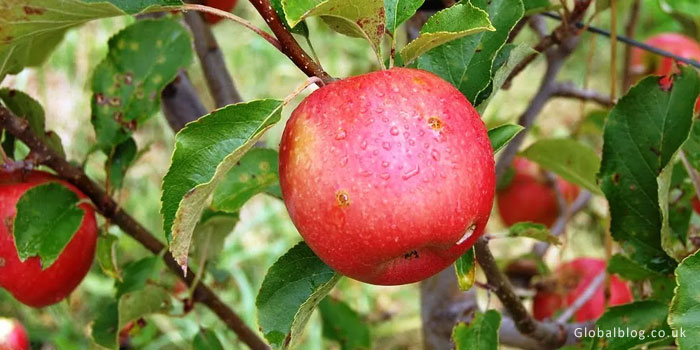Introduction to organic apples and their benefits
When it comes to snacking, few foods rival the humble apple. This crisp, juicy fruit has been a favorite for centuries. But have you considered making the switch to organic apples? These vibrant fruits not only taste better but also come packed with exceptional health benefits. Whether you’re munching on them fresh or incorporating them into your meals, organic apples deserve a special place in your kitchen. Let’s explore why these delightful gems should be your go-to choice for both flavor and wellness!
The difference between organic and conventional apples
Organic apples are grown without synthetic pesticides, herbicides, or fertilizers. This method prioritizes natural farming practices that enhance soil health and biodiversity. As a result, these apples often retain higher nutrient levels.
Conventional apples, on the other hand, may be treated with chemical inputs to fend off pests and diseases. While they can appear visually appealing and have longer shelf lives due to preservatives, this comes at the cost of potential chemical residues.
Taste also plays a significant role in distinguishing between the two. Many people find organic apples have a richer flavor profile compared to their conventional counterparts. The difference in growing methods allows organic varieties to develop more complex tastes.
Moreover, choosing organic supports sustainable farming practices that are better for the environment. This choice not only impacts your health but also contributes positively to local ecosystems and agricultural diversity.
The benefits of eating organic apples
Organic apples are not just delicious; they pack a nutritional punch. They are often richer in antioxidants compared to their conventional counterparts. These compounds help combat oxidative stress, which is linked to various chronic diseases.
Eating organic apples can also support digestive health. Their high fiber content promotes regularity and aids in maintaining a healthy gut microbiome.
Moreover, choosing organic means fewer pesticides on your fruit. This is particularly important since the skin of an apple can absorb chemicals found in non-organic farming practices.
The taste of apples tends to be fresher and more vibrant due to sustainable growing methods that focus on soil health and biodiversity. This enhances your eating experience, making each bite feel like a true treat from nature.
With so many benefits packed into every crunchy bite, it’s easy to see why organic apples deserve a spot in your daily diet.
How to incorporate apples into your diet
Incorporating organic apples into your diet is easier than you might think. Start your day with a quick apple slice on top of oatmeal or yogurt. Their natural sweetness will enhance the flavor without added sugars.
For lunch, toss chopped apples into salads for an extra crunch. They pair wonderfully with greens, nuts, and cheeses.
Snacking is simplified too. Keep whole organic apples handy for a nutritious grab-and-go option. Pair them with nut butter for a satisfying treat that fuels energy levels.
Dinner can also benefit from their versatility. Try adding diced organic apples to savory dishes, like roasted pork or chicken recipes; they bring tartness that balances rich flavors.
Don’t forget desserts! Bake sliced organic apples with cinnamon and oats for a wholesome dessert everyone will enjoy. The possibilities are endless when it comes to these delicious fruits!

Delicious recipes using organic apples
Organic apples can elevate a variety of dishes with their natural sweetness and crisp texture. Start your culinary adventure with a classic apple crisp. Slice apples, and toss them with cinnamon, oats, and a touch of honey before baking until bubbly.
For breakfast, consider an apple smoothie bowl. Blend apples with yogurt or almond milk. Top it off with granola, nuts, and fresh fruit for added crunch.
Looking for something savory? Try an apple and cheddar salad. Combine thinly sliced organic apples with sharp cheddar cheese on mixed greens. Drizzle balsamic vinaigrette over the top for extra flavor.
Don’t forget about homemade applesauce! Cook down peeled organic apples with a dash of lemon juice and spices until soft. Blend to your desired consistency—perfect as a snack or dessert option!
These recipes not only highlight the deliciousness of apples but also encourage creativity in the kitchen.
Tips for choosing and storing apples
When selecting organic apples, look for firmness and vibrant color. Avoid any with bruises or blemishes. A clean, smooth skin usually indicates freshness.
Smell is another key indicator. Ripe apples should have a sweet aroma. Trust your senses; they often know best.
Once you’ve picked the perfect apples, storage becomes crucial. Keep them in the refrigerator’s crisper drawer to maintain their crispness and flavor longer.
For optimal freshness, separate them from other fruits. Apples emit ethylene gas which can cause nearby produce to ripen prematurely.
Check regularly for any signs of spoilage and remove affected ones promptly to prevent others from going bad.
Enjoying your organic apples at their best requires just a bit of care and attention!
Conclusion: Why organic apples should be a staple in your diet
Choosing organic apples can significantly enhance your diet. They not only provide essential nutrients but also support sustainable farming practices. The absence of synthetic pesticides and fertilizers means you’re consuming fruit that’s free from harmful chemicals.
Embracing organic apples as part of your daily food choices not only benefits your health but also supports environmentally friendly agricultural methods. By making them a staple in your diet, you’re investing in both your well-being and the planet’s future.
